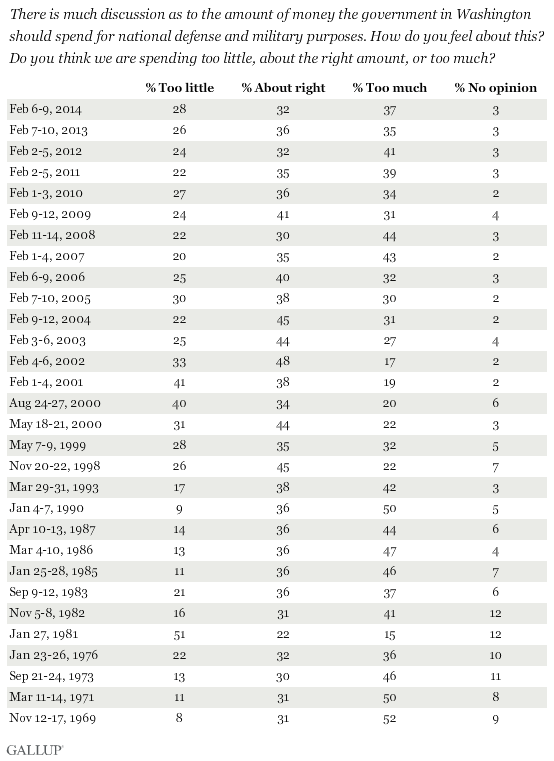PRINCETON, NJ -- As the Obama administration announces plans for further decreases in military spending, Gallup surveys show no broad consensus among Americans that the U.S. is spending too much or too little on the military. Americans' views of the money spent on national defense and the military have held fairly steady in recent years, with 37% now saying the nation spends too much and 28% saying it spends too little. The rest say spending is about right.
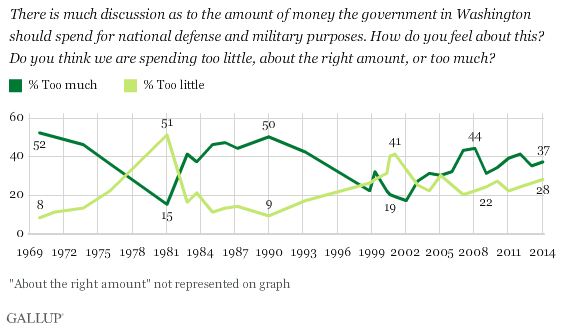
The most recent data are from Gallup's Feb. 6-9 World Affairs poll. Americans' attitudes on military spending have fluctuated since 1969, with occasional spikes in the "too much" and the "too little" viewpoints. Americans' current views are fairly moderate, with the percentages saying "too much" and "too little" falling about midway in the historical ranges. The complete trend, including the percentage saying spending is "about the right amount," is on page 2.
These attitudes have taken on a renewed importance as Secretary of Defense Chuck Hagel announced a far-reaching Pentagon defense plan Monday that would, among other things, cut the Army's size to its lowest level since before World War II.
Historically, Americans were most likely to believe the nation was spending "too much" on the military in 1969 (52%) and in the early 1970s, just after the peak of U.S. involvement in the Vietnam War. This belief also reached as high as 50% in 1990 after the major military buildup under Presidents Ronald Reagan and George H.W. Bush. Public concern that military spending was too high rose to 44% in the final year of the George W. Bush administration as the nation's military spending increased for the wars in Afghanistan and Iraq.
Americans were most likely to say the government was spending "too little" on the military in January 1981, just as Reagan was taking office after having won the election partly because of his emphasis on the need to build up America's military. Similarly, the "too little" percentage peaked in 2000 and early 2001 as George W. Bush campaigned for and won the presidency after a period of lower military spending during the Clinton administration.
Democrats Most Likely to Perceive Too Much Military Spending
As has historically been the case, there are political differences in views on defense spending. Democrats and independents are most likely to believe the nation is spending too much, while Republicans are most likely to say it is spending too little. Even so, current attitudes are not extreme on either side of the political equation, with slightly more than half of Democrats saying there is too much spending, and 49% of Republicans saying there is too little.
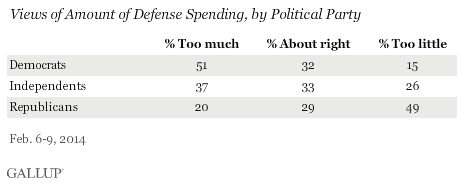
Americans Still Say U.S. Is No. 1 Military Power
U.S. military involvement around the world escalated sharply after September 2001, owing to the fight against terrorism, the major buildup involved in fighting wars in Afghanistan and Iraq, and increased use of special operations forces, which, by one count, are active in more than 100 countries. Throughout this period, a majority of Americans have continued to say the U.S. is the No. 1 military power in the world, although the extent of that belief has varied significantly.
Gallup has asked this question only periodically since 1993, with the high points coming that year and again in January 2010. A slim majority felt the U.S. was No. 1 militarily in 1999, near the end of the Clinton administration. The percentage has ranged between 50% and 54% in the past three years.
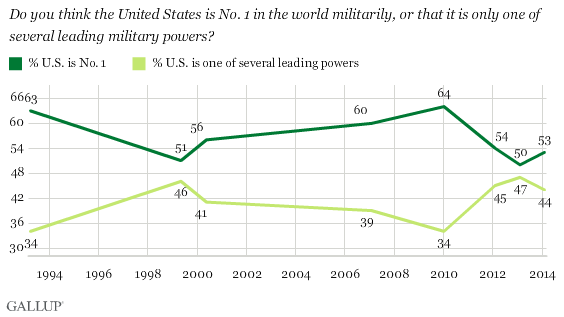
Democrats and Republicans have nearly identical views that the U.S. is No. 1 militarily; independents are a bit more skeptical. These views are similar to those measured last year.
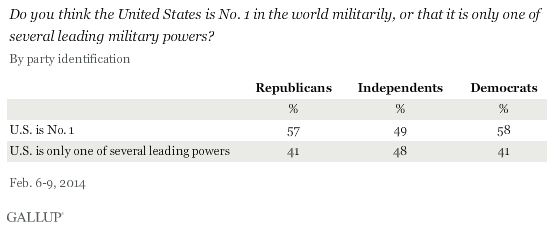
Bottom Line
U.S. spending on defense as a percentage of GDP has varied substantially in the 70 years since the huge military outlays of World War II. Spending increased from post-World War II levels during the Korean War, stayed relatively high during the Cold War and Vietnam War years that followed, began to fall during the 1970s, rose slightly during the Reagan administration, fell during the Clinton years, rose significantly during the last decade, and has now begun to fall again.
The American public's views on military spending have also varied, generally in reaction to these shifts. Americans were most likely to view spending as too high during Vietnam and the 1980s and early '90s, and most likely to view it as too little after the drop in spending in the 1970s and 1990s. Since 2002, Americans' views that the U.S. is spending too much increased concomitant with actual spending increases that followed 9/11 and U.S. involvement in two wars. Now, as the U.S. begins once again to decrease military spending, the public's attitudes are divided. Given these cuts, it would not be unusual if at some point the public once again began to say military spending had dropped too low, potentially making military preparedness a 2016 presidential campaign issue.
Survey Methods
Results for this Gallup poll are based on telephone interviews conducted Feb. 6-9, 2014, with a random sample of 1,023 adults, aged 18 and older, living in all 50 U.S. states and the District of Columbia.
For results based on the total sample of national adults, the margin of sampling error is ±4 percentage points at the 95% confidence level.
Interviews are conducted with respondents on landline telephones and cellular phones, with interviews conducted in Spanish for respondents who are primarily Spanish-speaking. Each sample of national adults includes a minimum quota of 50% cellphone respondents and 50% landline respondents, with additional minimum quotas by time zone within region. Landline and cellular telephone numbers are selected using random-digit-dial methods. Landline respondents are chosen at random within each household on the basis of which member had the most recent birthday.
Samples are weighted to correct for unequal selection probability, nonresponse, and double coverage of landline and cell users in the two sampling frames. They are also weighted to match the national demographics of gender, age, race, Hispanic ethnicity, education, region, population density, and phone status (cellphone only/landline only/both, and cellphone mostly). Demographic weighting targets are based on the most recent Current Population Survey figures for the aged 18 and older U.S. population. Phone status targets are based on the most recent National Health Interview Survey. Population density targets are based on the most recent U.S. census. All reported margins of sampling error include the computed design effects for weighting.
In addition to sampling error, question wording and practical difficulties in conducting surveys can introduce error or bias into the findings of public opinion polls.
View survey methodology, complete question responses, and trends.
For more details on Gallup's polling methodology, visit www.gallup.com.
